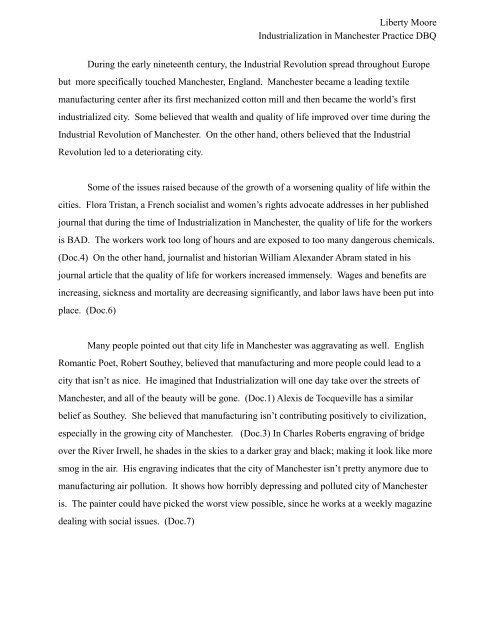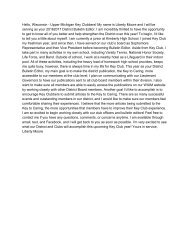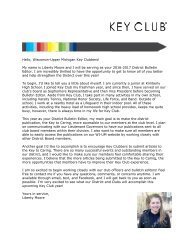Manchester DBQ - Google Docs
Create successful ePaper yourself
Turn your PDF publications into a flip-book with our unique Google optimized e-Paper software.
Liberty Moore<br />
Industrialization in <strong>Manchester</strong> Practice <strong>DBQ</strong><br />
During the early nineteenth century, the Industrial Revolution spread throughout Europe<br />
but more specifically touched <strong>Manchester</strong>, England. <strong>Manchester</strong> became a leading textile<br />
manufacturing center after its first mechanized cotton mill and then became the world’s first<br />
industrialized city. Some believed that wealth and quality of life improved over time during the<br />
Industrial Revolution of <strong>Manchester</strong>. On the other hand, others believed that the Industrial<br />
Revolution led to a deteriorating city.<br />
Some of the issues raised because of the growth of a worsening quality of life within the<br />
cities. Flora Tristan, a French socialist and women’s rights advocate addresses in her published<br />
journal that during the time of Industrialization in <strong>Manchester</strong>, the quality of life for the workers<br />
is BAD. The workers work too long of hours and are exposed to too many dangerous chemicals.<br />
(Doc.4) On the other hand, journalist and historian William Alexander Abram stated in his<br />
journal article that the quality of life for workers increased immensely. Wages and benefits are<br />
increasing, sickness and mortality are decreasing significantly, and labor laws have been put into<br />
place. (Doc.6)<br />
Many people pointed out that city life in <strong>Manchester</strong> was aggravating as well. English<br />
Romantic Poet, Robert Southey, believed that manufacturing and more people could lead to a<br />
city that isn’t as nice. He imagined that Industrialization will one day take over the streets of<br />
<strong>Manchester</strong>, and all of the beauty will be gone. (Doc.1) Alexis de Tocqueville has a similar<br />
belief as Southey. She believed that manufacturing isn’t contributing positively to civilization,<br />
especially in the growing city of <strong>Manchester</strong>. (Doc.3) In Charles Roberts engraving of bridge<br />
over the River Irwell, he shades in the skies to a darker gray and black; making it look like more<br />
smog in the air. His engraving indicates that the city of <strong>Manchester</strong> isn’t pretty anymore due to<br />
manufacturing air pollution. It shows how horribly depressing and polluted city of <strong>Manchester</strong><br />
is. The painter could have picked the worst view possible, since he works at a weekly magazine<br />
dealing with social issues. (Doc.7)
Liberty Moore<br />
Industrialization in <strong>Manchester</strong> Practice <strong>DBQ</strong><br />
Although most of the reactions were negative, there were still some positive reactions<br />
regarding the growth of industrialization of <strong>Manchester</strong>. Thomas B. Macaulay, a liberal Member<br />
of Parliament and historian, responded to Robert Southey’s belief of the growth of<br />
industrialization. Macaulay criticized him saying that he shouldn’t compare manufactures with<br />
beauty and how peasants have lived horrible lives. He is stating that because he is a member of<br />
parliament and only wants to increase the efforts of manufactures and agriculture to boost up the<br />
growth of England, without caring about the effects of it. (Doc.2) Wheelan and Co., who is<br />
promoting the growth of the industry, states that <strong>Manchester</strong> is remarkable and attractive.<br />
Although, there may be some bias in their statement due to the fact that they are a business.<br />
(Doc.5) Journalist and historian, William Alexander Abram, states how the conditions for factory<br />
labourers has been vastly improved and overall everything is improved; however, he wrote his<br />
journal article about this topic in 1868. (Doc.6)<br />
Referring to the various reactions of the Industrial Revolution, technological<br />
advancements, health of the citizens, and poor working conditions were major issues raised by<br />
the growth of <strong>Manchester</strong>, and people reacted to these issues in both negative and positive ways.<br />
The Industrial Revolution changed the environment for everyone’s life. The revolution changed<br />
energy usage, public health, natural resources, and social improvements as we know it. Over<br />
time, Machinery began to replace manual labor, increasing production of houses, food, clothing<br />
and more






